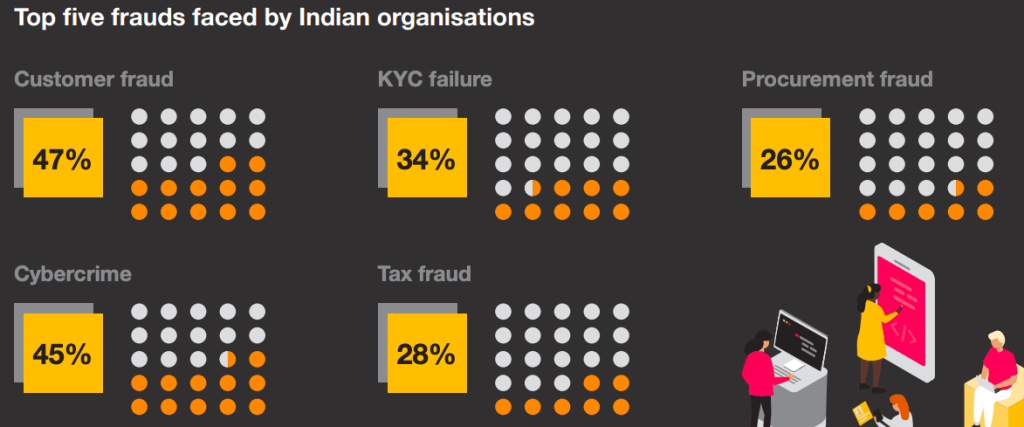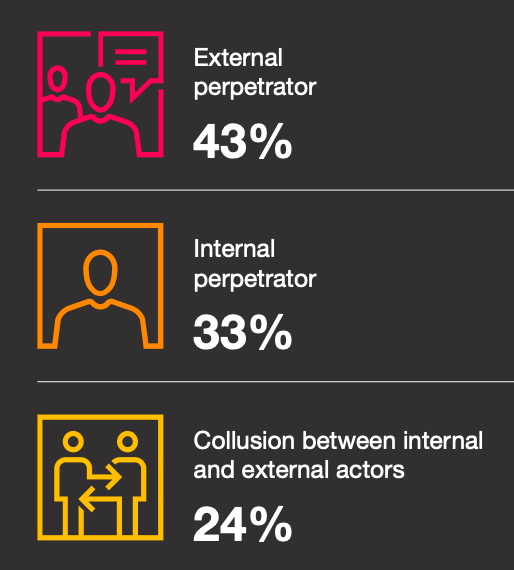The unexpected Covid-19 outbreak in 2020 left companies with no other option but to adopt work from home culture, among other major business disruptions. As a result, the world has witnessed a huge spike in the number of fraudsters and cybercriminals in the last two years. A whopping 52% of Indian companies have experienced some form of fraud or other economic crime in the last 24 months. Surprisingly, an astonishing 95% of these have experienced new types of fraud as a result of the disruption caused by COVID-19.
The new types of fraud experienced by Indian businesses in 2022 include misconduct risk (67%), legal risk (16%), cybercrime (31%), insider trading (19%), and platform risk (38%).
A recent PwC report titled “Global Economic Crime and Fraud Survey 2022: India Insights” reveals some surprising facts related to the rise in corporate fraud following the Covid pandemic.
Due to the obvious abrupt shift to remote offices or, let’s just say, work from home, many employees are now working in a less-secure environment. Since many remote workers are unfamiliar with approved telework solutions, they are most likely to install their own software or use personal devices for business purposes, increasing security risks.
The top five frauds experienced by Indian companies are customer fraud, KYC failure, procurement fraud, cybercrime, and tax fraud.

Customer fraud in India on the rise
The top most common fraud reported by 47% of Indian companies was customer fraud, which includes fraud involving mortgage, credit cards, claims, cheques, etc. Cybercrime came a close second, with 45% of Indian organisations reporting this type of fraud.
Furthermore, a notable 34% of Indian businesses had experienced fraud due to KYC (know-your-customer) failure in the last 24 months. As the adoption of smartphones and the Internet has grown significantly over the last few years, so has KYC fraud. Customers are easily duped by fraudsters who ask them to share personal information such as account login information, card details, and OTP, in order to gain unauthorized access to their bank accounts. RBI has repeatedly warned customers not to share any personal information with an unknown person/organisation.
Fraud prevention has also become challenging for businesses, with nearly 67% of surveyed companies reporting that the most disruptive incident was caused by an external attack or collusion between external and internal parties. Hackers (49%), customers (41%), and organised crimes (31%) were the most common external perpetrators.

Impact of fraud on big companies vs small
Fraud and economic crimes affected both big and small businesses, however, on different scales. The PwC survey found that large corporations are more likely to be victims of fraud or any kind of cybercrime. Overall, a whopping 60% of surveyed Indian companies, with global annual revenues exceeding $1 billion, experienced fraud during the past 24 months.
On the other hand, only 37% of surveyed companies, with global annual revenues of less than $100 million, experienced fraud during the same period.
In terms of financial losses, about 14% of companies lost $50 million or more, 28% lost between $1-$50 million, and 50% lost less than $1 million due to all incidents of fraud, corruption or other economic crimes over the last 24 months.

